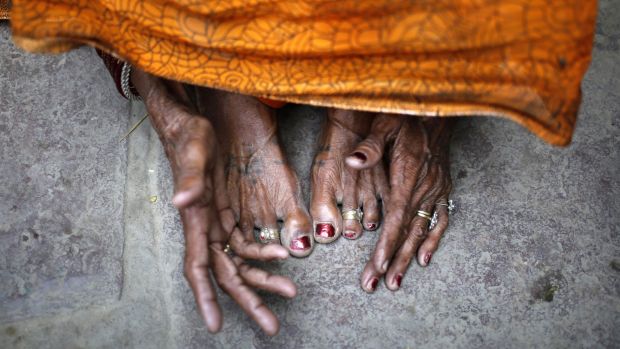
The hands and feet of a mother of a 30-year-old woman who died after she underwent a sterilisation surgery at a government mass sterilisation “camp”. Photo: Reuters
New Delhi: It has been four days since Gauri Bai has seen her daughter-in-law, Rashmi, who became ill after a botched procedure at a mass sterilisation camp in the town of Bilaspur on Saturday.
Rashmi, a 27-year-old mother of two, started vomiting and complaining of severe pain the day after she went to the camp, where she and dozens of other women were given tubal ligations by a doctor working at breakneck speed. Her family rushed her to the hospital on Sunday evening, but they have been barred from seeing her since Monday and fear the worst.
“We suspect she’s already dead,” said Gauri Bai, 54. “We thought the government is running the program for the benefit of the poor, but they have cheated us. We want the guilty to be punished. They have destroyed my family. Who will take care of these little children?”

A woman, who underwent sterilisation surgery at a government mass sterilisation “camp”, walks in a hospital in Bilaspur, in the eastern Indian state of Chhattisgarh. Photo: Reuters
Public anger is running high in Bilaspur, in the central Indian state of Chhattisgarh, as authorities expand their investigation in the wake of Saturday’s tragedy, in which 13 women died and dozens more were sickened. Authorities said they raided two drug companies and began examining sterilisation procedures carried out Sunday and Monday at two other camps where one woman died and others fell ill.
The doctor who performed Saturday’s operations, R.K. Gupta, was arrested late Wednesday and charged with culpable homicide and negligence.
Sonmani Borah, the divisional commissioner of Bilaspur, said 122 women are now being treated at various area hospitals and that a judicial inquiry has been ordered into the incident, along with ongoing police and medical board investigations.
“We are convinced that something went wrong, and those responsible will be dealt with severely. As of now nothing can be ruled out,” Mr Borah said. “The investigations will look into negligence on part of the doctors and medical staff, the quality of medicines provided at the camp and the equipment used in the procedure.”
In the wake of the tragedy, a debate arose about whether the women had been coerced or coaxed into having sterilisation surgeries and whether the health workers were pressuring them in order to meet government targets.
Although the national government has said since the 1990s that it no longer sets public targets for the number of women sterilised, Mr Borah said the district family planning department was trying to reach its annual goals when it organised the mass drives in recent days. Women were given 1400 rupees, or about $US22, for the surgeries. A “motivator,” usually a local public health worker, was paid 200 rupees (about $US3.25) to bring a woman to the camp.
“The district family planning department have annual targets, and they try to convince more and people into these camps,” Mr Borah said. “We will see if there was breach of protocol on part of the officials.”
Gupta, the doctor who performed 83 surgeries in about six hours, told reporters he had been pressured to meet sterilisation quotas given to him by local authorities.
“It was not my fault – the administration pressured me to meet targets,” the doctor said, according to NDTV, an Indian news channel.
Sterilisation is the most prevalent method of family planning in India, government data show, and the federal Ministry of Health and Family Welfare has often been accused of relying too heavily on the quick fix of sterilisation as a method of birth control rather than on pills, condoms or public education. Male sterilisation remains rare, and the vast majority of those being sterilised are women, statistics show.
“The incident has exposed the dire state of public health services, particularly in rural India,” said Meenakshi Ganguly, the South Asia director of Human Rights Watch. “While women should be informed about available methods of contraception so that they can make informed decisions, the government has adopted a target-driven approach to female sterilisations, leading to compromises in medical practices.”
Human Right Watch noted in a 2012 report that India had announced in 1996 it would take a “target-free” approach to family planning. “But in practice, state-level authorities and district health officials assign targets for health workers for every contraceptive method, including female sterilisation,” the report said.
Washington Post
